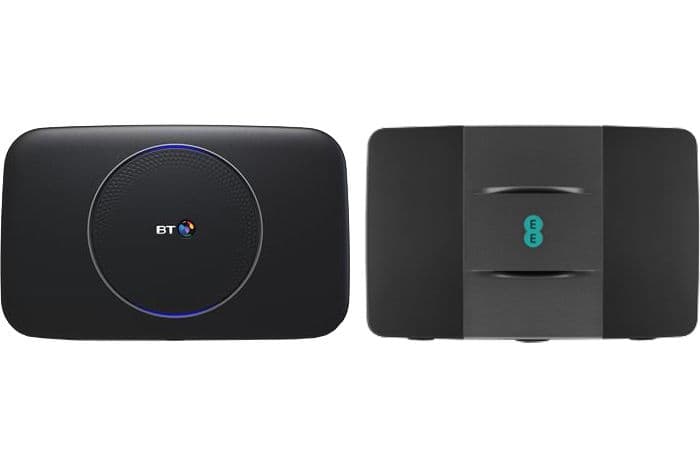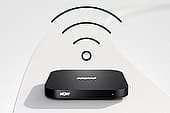BT is the UK's best-known broadband provider, and offers competitive pricing on premium plans with full fibre availability across 50% of homes.
EE, also owned by BT, is another premium broadband brand with almost the exact same pricing as BT, but benefiting from some newer features.
Overall, EE and BT are highly comparable, offering nearly the same service and features, with just a few differences.

At a glance: BT vs EE
| BT | EE | |
|---|---|---|
| Monthly price | From £29.99 | From £27.99 |
| Setup cost | Free to £11.99 | Free to £11.99 |
| Minimum term | 24 months | 12 or 24 months |
| Annual price rise | £3 per month in on March 31 | £3 per month on March 31 for broadband £2 per month on March 31 for TV |
| Connection | Part fibre, full fibre | Part fibre, full fibre |
| Download speeds | 36Mb, 50Mb, 67Mb, 74Mb, 150Mb, 300Mb, 500Mb, 900Mb | 36Mb, 50Mb, 67Mb, 149Mb, 308Mb, 500Mb, 900Mb, 1.6Gb |
| Upload speeds | 9Mb, 18Mb, 20Mb, 30Mb, 49Mb, 73Mb, 110Mb | 9Mb, 18Mb, 30Mb, 51Mb, 73Mb, 110Mb, 115Mb |
| Router | BT Smart Hub 2 | Smart Hub Plus |
| WiFi guarantee | £10/mth for Complete WiFi | £7/mth for Smart WiFi Plus |
| Parental controls | BT Parental Controls | EE Parental Controls |
| Home phone | £5/mth | £5/mth |
| Anytime calls | £18/mth (inc. UK mobiles) | £18/mth (inc. UK mobiles) |
| TV | EE TV | EE TV |
Best deals
| Package | Broadband | Monthly price | Upfront price | Contract term | |
|---|---|---|---|---|---|
 |
Full Fibre 100 | 150Mb average | £29.99 | Free | 24 months |
Price
Winner: It's a tie. BT and EE have remarkably similar prices, with all standard broadband plans costing the same per month.
BT and EE are both owned by the BT Group, and while EE is pegged to become BT's premium broadband brand, pricing is currently almost identical between the two names.
Pricing starts at £30.99 per month for full fibre broadband with average download speeds of 150Mb at peak times:
| Package | Broadband | Monthly price | Upfront price | Contract term | |
|---|---|---|---|---|---|
 |
Full Fibre 100 | 150Mb average | £29.99 | Free | 24 months |

|
Full Fibre 150 Essentials | 149Mb average | £29.99 | Free | 24 months |
It has to be said, over £30 for an entry-level full fibre broadband deal is not cheap. Households looking for the best price would be better off with budget-brand Plusnet, which is also owned by BT, and has pricing starting at £27.99 for equivalent speeds.
Neither provider include a home phone line as standard, but it can be added at £5 per month with both BT or EE. Unlimited anytime calls are also priced the same at £18 per month.
For faster full fibre broadband plans, BT and EE are also priced the same, and are in fact, the same price across all full fibre packages, with the only variation being on their part fibre plans, where EE can be cheaper.
| Package | Broadband | Monthly price | Upfront price | Contract term | |
|---|---|---|---|---|---|
 |
Full Fibre 500 | 500Mb average | £34.99 | Free | 24 months |

|
Full Fibre 500 Essentials | 500Mb average | £33.99 | Free | 24 months |
Setup fees are currently mirrored across brands, as is the new annual price rise policy of increases of £3 per month on March 31st of each year.
Overall, in terms of price, BT and EE are pretty much neck-and-neck, with a company pricing policy clearly aiming to match the brands by the penny.
Broadband packages
Winner: EE offer one or two extras that aren't available with BT, but otherwise the providers are nearly identical in terms of package choices.
EE and BT both exclusively provide broadband connections using the Openreach network of superfast part fibre and full fibre. Which means they have full fibre availability at the same locations and both pass 16 million premises, or 50% of UK homes so far.
Side-by-side their standard full fibre broadband plans compare like this:
| Package | Broadband | Monthly price | Upfront price | Contract term | |
|---|---|---|---|---|---|

|
Full Fibre 2 | 74Mb average | £28.99 | Free | 24 months |

|
Fibre 67 Essentials | 67Mb average | Free for 3 mths, then £32.99 |
Free | 24 months |

|
Full Fibre 100 | 150Mb average | £29.99 | Free | 24 months |

|
Full Fibre 150 Essentials | 149Mb average | £29.99 | Free | 24 months |

|
Full Fibre 300 | 300Mb average | £32.99 | Free | 24 months |

|
Full Fibre 300 Essentials | 308Mb average | Free for 3 mths, then £36.99 |
Free | 24 months |

|
Full Fibre 500 | 500Mb average | £34.99 | Free | 24 months |

|
Full Fibre 500 Essentials | 500Mb average | £33.99 | Free | 24 months |

|
Full Fibre 900 | 900Mb average | £40.99 | Free | 24 months |

|
Full Fibre Gigabit Essentials | 900Mb average | £38.99 | Free | 24 months |
For those not yet passed by full fibre broadband, customers can choose one of their part fibre plans instead, which compare like this:
| Package | Broadband | Monthly price | Upfront price | Contract term | |
|---|---|---|---|---|---|

|
Fibre 2 | 67Mb average | £28.99 | Free | 24 months |

|
Fibre 67 Essentials | 67Mb average | Free for 3 mths, then £32.99 |
Free | 24 months |
All of these packages can be customised further, with EE and BT offering a range of equivalent service extras from a digital home phone line to WiFi boosters.
Here are the various options that can be taken with EE and BT broadband and how much they cost with each provider:
| BT Broadband | EE Broadband | |
|---|---|---|
| Digital home phone | £5 | £5 |
| Anytime UK calls | £18 | £18 |
| WiFi guarantee | £10 | £7 |
| 4G mobile back-up | £7.55 | £7 |
| WiFi enhancer | N/a | £5 |
| Router upgrade | N/a | £10 |
| Home tech expert setup | £30 one-off | N/a |
| EE TV | From £20 | From £20 |
While not all of the added options are mutually exclusive, many of them are and are priced similarly or the same too.
Both providers have a minimum contract term of 24 months on their broadband plans, while customers choosing EE can also opt for a shorter 12-month plan for £5 per month extra.
Overall, broadband packages and prices are eerily similar between BT and EE, likely due to their eventual amalgamation. Yet, for now, EE have slightly more options, particularly around offering a more up to date router and optional router upgrade.
Broadband speed
Winner: EE offer Openreach's top speed full fibre package of 1.6Gbps, while BT's top full fibre speed is only 900Mbps.
Despite being available since early 2024, Openreach's top of the range 1.6Gbps broadband plan is so far only being sold by EE and Vodafone.
That means, BT's fastest full fibre broadband option is the now, more typical, 900Mbps average download speeds at peak times.
EE offer customers the choice of the following full fibre broadband speeds:
| Average download speed | Average upload speed | |
|---|---|---|
| Full Fibre 150 | 149Mb | 30Mb |
| Full Fibre 300 | 308Mb | 51Mb |
| Full Fibre 500 | 500Mb | 73Mb |
| Full Fibre 900 | 900Mb | 110Mb |
| Full Fibre 1.6 | 1.6Gb | 115Mb |
While, BT offer these full fibre broadband speeds:
| Average download speed | Average upload speed | |
|---|---|---|
| Full Fibre 1 | 50Mb | 10Mb |
| Full Fibre 2 | 74Mb | 20Mb |
| Full Fibre 100 | 150Mb | 30Mb |
| Full Fibre 300 | 300Mb | 49Mb |
| Full Fibre 500 | 500Mb | 73Mb |
| Full Fibre 900 | 900Mb | 110Mb |
Advertised average download speeds must be received by at least 50% of a broadband provider's customers during the peak hours of 8pm to 10pm when the network is busiest. As such, they're a reliable measurement of how fast a connection is likely to be.
It's interesting then that, both and average download and upload speeds delivered by BT and EE are more or less the same. EE's fastest 1.6Gb plan also seems to fail to deliver much of a speed boost to uploads, coming in only 5Mbps faster than the gigabit plans offered by EE and BT.
We can also look at the minimum speed guarantees offered by BT and EE, to see which provider is offering the best assurances of their performance.
Minimum speed guarantees were introduced by Ofcom as a voluntary code of practice, which should be offered to customers at the point of sign up, and if not met, customers are allowed to leave their contract penalty free.
We tested one location with access to Openreach full fibre broadband and were provided with the following minimum download speed guarantees by BT and EE:
| Estimated download speed | Minimum guaranteed download speed | |
|---|---|---|
| BT Full Fibre 100 | 150Mb | 100Mb |
| EE Full Fibre 150 | 149Mb | 100Mb |
| BT Full Fibre 300 | 300Mb | 150Mb |
| EE Full Fibre 300 | 308Mb | 150Mb |
| BT Full Fibre 500 | 500Mb | 425Mb |
| EE Full Fibre 500 | 500Mb | 425Mb |
| BT Full Fibre 900 | 900Mb | 700Mb |
| EE Full Fibre 900 | 900Mb | 700Mb |
| EE Full Fibre 1.6 | 1600Mb | 1300Mb |
Both BT and EE promise the same minimum download speeds on each of their equivalent broadband plans.
Overall, BT and EE are pretty much neck and neck on speed, with little between them. Except, of course, if you're looking to try out EE's Full Fibre 1.6Gb plan, which isn't yet available with BT.
Router
Winner: EE offer a more up to date router as standard than BT, and also offer the option to upgrade to the latest WiFi 7 device too.
All EE broadband customers are supplied with the EE Smart Hub Plus, it offers support for WiFi 6 (or 802.11ax) and hosts seven internal antennae and four 1Gb Ethernet LAN ports.
All BT broadband customers are provided with the BT Smart Hub 2, which is really the predecessor of the newer Smart Hub Plus, and was initially released way back in 2018. The BT Smart Hub 2 supports WiFi 5 (802.11ac), as well as intelligent mesh and also hosts seven antennae and four 1Gb Ethernet LAN ports.
While the BT Smart Hub 2 isn't bad, and it'll certainly be more than adequate for many households, it's hard to ignore the fact it is starting to look a little dated, especially with WiFi protocols now actually up to WiFi 7.
Here are the specifications of the routers side-by-side:
| BT Smart Hub 2 | EE Smart Hub Plus | EE Smart Hub Pro | |
|---|---|---|---|
| Year released | 2018 | 2023 | 2024 |
| WiFi protocol | 5 (802.11ac) | 6 (802.11ax) | 7 (802.11be) |
| WiFi bands | Dual-band | Dual-band | Tri-band |
| 2.4GHz | 3x3 | 3x3 | 4x4 |
| 5GHz | 4x4 | 4x4 | 4x4 |
| 6GHz | - | - | 4x4 |
| Antennae | 7 | 7 | 12 |
| Ethernet LAN | 4 x 1Gb | 4 x 1Gb | 4 x 2.5Gb |
| Mesh | Yes | Yes | Yes |
| Security | WPA2 | WPA3 | WPA3 |
EE customers can also upgrade to the EE Smart Hub Pro, which offers support for WiFi 7, and this costs an extra £10 per month. It's worth bearing aware however, that to benefit from the faster speeds of WiFi 7 connecting devices also need to support WiFi 7, or 802.11be, as well, which many won't. WiFi 7 was only released in 2024 and so far, few devices support it, so the extra cost may not really be worthwhile at the moment.
Both EE and BT routers support mesh, and customers can take out a WiFi guarantee for an additional £7 and £10 per month respectively. Both providers guarantee a 'strong' signal on the MyBT (or MyEE) app in every room in the home or customers can claim £100 back.
Overall, EE win the router category against BT due to offering a more up to date router as standard, although upgrading to WiFi 7 could be an unnecessary expense for most.
Customer service
Winner: It's a tie. EE used to have a better customer service record than BT, but complaints for the provider have increased in recent years.
BT and EE have both maintained low complaint records over the past few years, although complaints for EE have been increasing since late 2023.
In Ofcom's latest quarterly complaint figures, Q2 2024, EE received 14 complaints per 100,000 customers, while BT only received 10 in line with the industry average for the period.
That said, EE had fewer complaints about their broadband service throughout 2023 than BT did, gathering a total of 32 complaints per 100,000 customers over the year, compared to 47 against BT.
Looking at other research into customer satisfaction carried out by Ofcom, we can see that customers of EE are generally more satisfied than those of BT, while satisfaction with complaints handling is on a par, while BT resolve more complaints on first contact than EE does.
| BT broadband | EE broadband | |
|---|---|---|
| Satisfaction with overall service | 83% | 85% |
| Satisfaction with speed of service | 80% | 81% |
| Satisfaction with complaints handling | 55% | 55% |
| Customers with a reason to complain | 19% | 13% |
| Complaints resolved on first contact | 44% | 39% |
| Complaints per 100,000 customers in 2023 | 47 | 32 |
| Average call waiting time | 2 minutes, 45 seconds | 1 minute, 6 seconds |
Both EE and BT now exclusively use UK-based call centres, and while BT answer the phone in 2 minutes 45 seconds on average, EE tend to pick up faster, with customers waiting just 1 minute and 6 seconds on average to get through to someone.
Overall, we'd call a tie in this category with both providers gathering similar levels of complaints, yet, EE have performed better than BT in the past.
Verdict: BT broadband or EE broadband?
Overall winner: It's a tie. BT and EE are almost neck-and-neck in most areas, with BT offering new customers reward cards, and EE sporting a more up to date router.
EE is set to become BT's premium broadband brand, yet, confusingly, is already being marketed as 'powered by BT'.
Both providers offer near identical pricing and broadband speed options, as well as vastly similar add-ons, like the WiFi guarantee and Hybrid Connect service.
There are a few differences however, they do set them apart, just.
BT offer new customers a £50 Reward Card that can be spent anywhere MasterCard is accepted on all broadband plans above Fibre 1.
While EE supply a more up to date router in the Smart Hub Plus, which supports WiFi 6, while BT are still providing the older Smart Hub 2, which only supports up to WiFi 5.
Ultimately, it seems whichever brand a customer chooses they may get a very similar service, and will more than likely be paying the same price for it in any case.
Read more more about BT broadband, or see how EE broadband compares to Vodafone, or against BT's other brand, Plusnet.








Comments